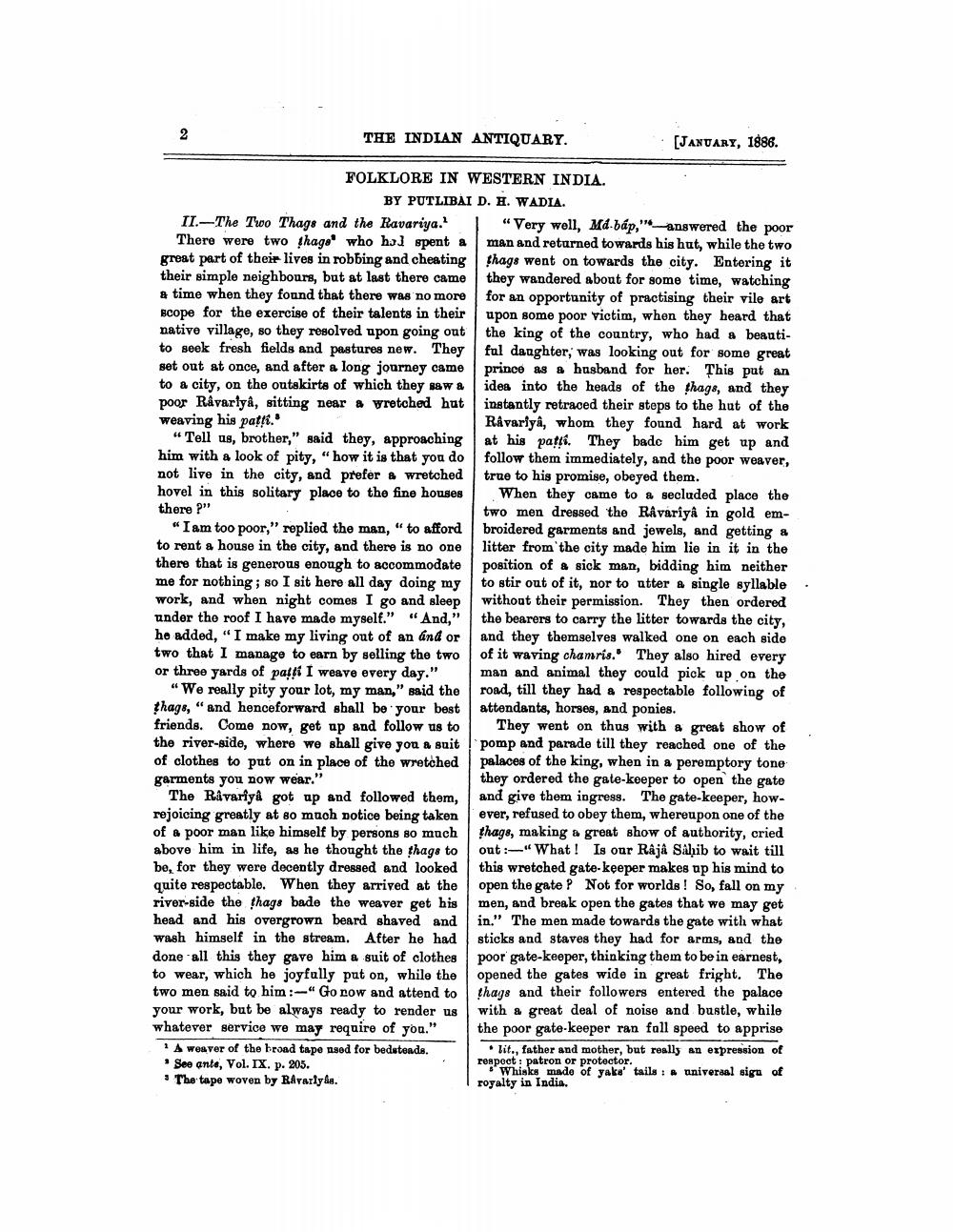________________
2
THE INDIAN ANTIQUARY.
FOLKLORE IN WESTERN INDIA. BY PUTLIBAI D. H. WADIA.
II.-The Two Thags and the Ravariya. There were two thage who had spent a great part of their lives in robbing and cheating their simple neighbours, but at last there came a time when they found that there was no more scope for the exercise of their talents in their native village, so they resolved upon going out to seek fresh fields and pastures new. They set out at once, and after a long journey came to a city, on the outskirts of which they saw a poor Råvarlyà, sitting near a wretched hut weaving his patti.
"Tell us, brother," said they, approaching him with a look of pity, "how it is that you do not live in the city, and prefer a wretched hovel in this solitary place to the fine houses there ?"
"I am too poor," replied the man, " to afford to rent a house in the city, and there is no one there that is generous enough to accommodate me for nothing; so I sit here all day doing my work, and when night comes I go and sleep under the roof I have made myself." "And," he added, "I make my living out of an and or two that I manage to earn by selling the two or three yards of patti I weave every day."
"We really pity your lot, my man," said the thage, "and henceforward shall be your best friends. Come now, get up and follow us to the river-side, where we shall give you a suit of clothes to put on in place of the wretched garments you now wear."
The Ravariya got up and followed them, rejoicing greatly at so much notice being taken of a poor man like himself by persons so much above him in life, as he thought the thags to be, for they were decently dressed and looked quite respectable. When they arrived at the river-side the thags bade the weaver get his head and his overgrown beard shaved and wash himself in the stream. After he had done all this they gave him a suit of clothes to wear, which he joyfully put on, while the two men said to him:-" Go now and attend to your work, but be always ready to render us whatever service we may require of you."
A weaver of the broad tape used for bedsteads. See ante, Vol. IX. p. 205. The tape woven by Ravarly&s.
[JANUARY, 1886.
"Very well, Má báp," answered the poor man and returned towards his hut, while the two thags went on towards the city. Entering it they wandered about for some time, watching for an opportunity of practising their vile art upon some poor victim, when they heard that the king of the country, who had a beautiful daughter, was looking out for some great prince as a husband for her. This put an idea into the heads of the thags, and they instantly retraced their steps to the hut of the Råvariyâ, whom they found hard at work at his patts. They bade him get up and follow them immediately, and the poor weaver, true to his promise, obeyed them.
When they came to a secluded place the two men dressed the Râvariyâ in gold embroidered garments and jewels, and getting a litter from the city made him lie in it in the position of a sick man, bidding him neither to stir out of it, nor to utter a single syllable without their permission. They then ordered the bearers to carry the litter towards the city, and they themselves walked one on each side of it waving chamris. They also hired every man and animal they could pick up on the road, till they had a respectable following of attendants, horses, and ponies.
They went on thus with a great show of pomp and parade till they reached one of the palaces of the king, when in a peremptory tone they ordered the gate-keeper to open the gate and give them ingress. The gate-keeper, however, refused to obey them, whereupon one of the thags, making a great show of authority, cried out:-"What! Is our Râjâ Sahib to wait till this wretched gate-keeper makes up his mind to open the gate? Not for worlds! So, fall on my men, and break open the gates that we may get in." The men made towards the gate with what sticks and staves they had for arms, and the poor gate-keeper, thinking them to be in earnest, opened the gates wide in great fright. The thags and their followers entered the palace with a great deal of noise and bustle, while the poor gate-keeper ran fall speed to apprise
lit., father and mother, but really an expression of respect: patron or protector.
Whisks made of yake' tails: a universal sign of royalty in India.




